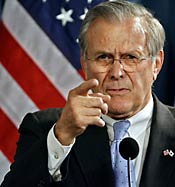 Reading moviecitynews on Zhang Yimou's upcoming Curse Of The Golden Flower, I found a link to this review of Zhang's Hero by Armond White. White's an interesting writer, but I've always seen him as more provocateur than critic, and the bulk of his glowing review is what you'd expect: it looks great, Zhang's an artist unlike those Hollywood hacks, a dig at Tarantino, praise for Christopher Doyle, some blatant ignorance of Chinese film, but two paragraphs contain the germ of an idea that resolves the tension I've always had with the film, namely its seeming pro-fascist political statement (that violent abuses by the state against its people are justified in the name of national unity).
Reading moviecitynews on Zhang Yimou's upcoming Curse Of The Golden Flower, I found a link to this review of Zhang's Hero by Armond White. White's an interesting writer, but I've always seen him as more provocateur than critic, and the bulk of his glowing review is what you'd expect: it looks great, Zhang's an artist unlike those Hollywood hacks, a dig at Tarantino, praise for Christopher Doyle, some blatant ignorance of Chinese film, but two paragraphs contain the germ of an idea that resolves the tension I've always had with the film, namely its seeming pro-fascist political statement (that violent abuses by the state against its people are justified in the name of national unity).White writes:
Hero is an exercise in what academics call narrativity. Nameless represents the anonymous handing-down of legend, and when his stories are matched by the emperor's own counter-myths, the film grows into an elaborate—hell, magnificent—demonstration of pop-culture communication. Zhang shows how stories that are eagerly received can also be improved upon—for reasons that are either political, emotional or for sheer creative inspiration.
. . . .
Zhang and Doyle turn love and war—ecstasy and tragedy—into surreal extravagance. It's not decorative, it's volatile. And they keep the marvels coming: a showdown amidst golden leaves that change color as if they possessed mood, a resting place on a glistening lake that suggests an Asian Valhalla, as well as the psychic lunarscapes in Wong Kar Wai's Ashes of Time.
These settings seem heightened (if not created) by each character's longing. Every one of Jet Li's tales as Nameless situates a scene in a personal motive, yet, soon, the same imagery is doomed by mankind's intrigues. No other Jet Li film I've seen has been this sophisticated about national myth. Zhang explores the moral complexity of history.
This conception of the film, as a series of competing narratives, each one topping the other in order to create a foundational national myth transforms the film into an investigation into and even an attack on the kind of authoritarianism I (and Senses Of Cinema) saw in the film. Instead of valorizing Jet Li's assassin sacrificing himself to the murderous Qin Emperor on the altar of national unity, Zhang's instead showing how the state creates such myths in order to consolidate its own power over the people. It's therefore a critique of both the state and the large majority of patriotic propaganda films. Such an attack is consistent with Zhang's other films and his reputation as a Mainland Chinese filmmaker who's worked for 30 years subverting and obliquely critiquing that country's bizarre form of government from within.
So, a Yay! and a Thanks! to Armond White!
Addendum: I just watched Hero again, and I think this interpretation works. Not only is Zhang critiquing the use of narrative to support the state, but he's more specifically attacking the whole idea of Taoist/Buddhist "passivity" in the face of authoritarianism. Tony Leung's Broken Sword is a Taoist who achieves a kind of enlightenment through calligraphy and renounces fighting in the name of peace. He convinces Jet Li's Nameless of the correctness of his position: that fighting is pointless and counterproductive to the unity of "Our Land". Nameless spares the Emperor when the Emperor claims to understand the secret in Broken Sword's calligraphy ("The ultimate ideal is when the sword disappears altogether. The warrior embraces all around him. The desire to kill no longer exists. Only peace remains.") In the end, though, the Emperor has Nameless executed (in a scathing attack on the anti-individualist, anti-humanist hive mentality of bureaucracy, when dozens of his advisors, all speaking in one voices, demand Nameless be killed). Thus the Taoist renunciation accomplishes only the death of the "hero" and the elevation of the murderous tyrant.
